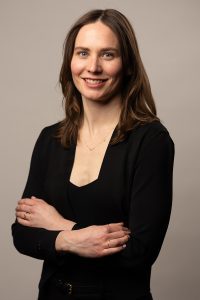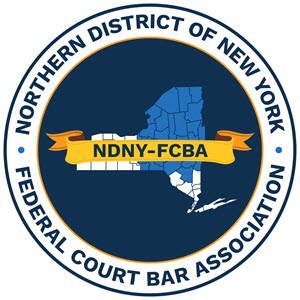Interviewed By Janelle A. Pelli
 Julie Nociolo is a partner at Hacker Murphy LLP, specializing in criminal defense and representing accused students in college and university disciplinary proceedings. She is a member of the FCBA’s First Decade Committee and got her start in the Northern District of New York through a clerkship with the late United States District Judge Gary L. Sharpe. In this interview, Nociolo discussed her practice, including the nuances and challenges of representing accused students.
Julie Nociolo is a partner at Hacker Murphy LLP, specializing in criminal defense and representing accused students in college and university disciplinary proceedings. She is a member of the FCBA’s First Decade Committee and got her start in the Northern District of New York through a clerkship with the late United States District Judge Gary L. Sharpe. In this interview, Nociolo discussed her practice, including the nuances and challenges of representing accused students.
1. First, can you tell us a bit about yourself and your background?
I am a partner at Hacker Murphy. This will be my seventh year here. I work primarily as a criminal defense attorney, as well as representing clients accused of various misconduct in different forums, from students in universities, to professionals before licensing agencies.
I am originally from Monmouth County, NJ. I went to undergrad at SUNY Geneseo. After that, I spent some time as a paralegal at a big firm in New York City before attending law school, then went to New York Law School. After law school, I clerked as a central staffer at the Court of Appeals in Albany, then went to clerk in Judge Gary Sharpe’s chambers in the Northern District of New York.
2. What drew you to specialize in criminal law and misconduct cases?
I really enjoy being in court and helping individuals during the most difficult points in their life. Seeing that direct impact on my clients has been really fulfilling for me as an attorney.
3. Can you tell us about your work defending accused students at colleges and universities?
I work in and beyond New York State defending accused students in school proceedings. This work can include some of my most difficult cases because I have to educate families about a process that they are very unfamiliar with. The rules have been shifting over the past several years, depending on the administration. Although the procedure is generally the same, how schools implement those procedures can vary. I have found it helpful to establish close relationships with my student clients so they feel comfortable and prepared to defend themselves if a case proceeds to a hearing, and so my clients can decide whether it makes sense to try to resolve the matter. Sometimes the matters overlap with criminal proceedings, in which case the criminal case usually takes the lead and dictates where the case will go.
People make mistakes or are falsely accused, my goal for all my clients is to try to minimize or eliminate the impact an accusation may have on future opportunities. It’s not just about what will happen at school, it’s also about how these things may impact them with career opportunities down the line.
4. How did you get into practicing in this area of the law?
My firm had some Title IX work when I joined, which has only expanded since I’ve been here. I am also a member of an accused student nationwide network, which has been ever helpful in navigating the legal landscape. This work involves a small community of practitioners, and the network has also been a good source of referrals.
5. What lessons have you learned in that work?
The most important lesson I have learned is to make sure that your client and their family have a clear sense of what can happen in these proceedings, to help them set reasonable expectations. I’ve also learned that it is important to be able to articulate to the families the perspectives on all sides of the matters, including the school and the complainant, so they can best understand what they are facing.
6. What do you find to be most challenging about that work?
The most challenging aspect of this work is how different it is from a courtroom, in terms of the rules that apply and the standard of proof (which is a lot lower than in a criminal case). It’s also important to be creative in proposing solutions to these matters.
7. You are a former federal clerk, tell us a bit about the clerkship experience and what you took away from that.
I had the privilege of clerking for Judge Sharpe, which was so eye-opening in many ways, especially coming from the appellate perspective at my prior clerkship with the Court of Appeals. It was great to see how a record is developed through attorneys on the ground level. I always knew that I wanted to be in the courtroom. Clerking was a nice way to get a behind-the-scenes view of what judges look at when they are deciding the issues before them.
In Judge Sharpe’s chambers, I had excellent co-clerks who had been there before and mentored and trained me. Clerking sharpened my writing and analytical skills. What has been really satisfying about clerking and now being a practitioner in the Northern District of New York – it feels like I’m coming home when I am there. We are fortunate to have such a tight-knit bar here, where we have individuals who clerked and now practice in the area. It is such a nice environment to practice in.
8. How has the NDNY Federal Court Bar Association played a role in the development of your career?
FCBA has been great primarily for continued networking with other federal practitioners, but also with educating through all the CLE opportunities it has. We have an associate here who is about to go to the NDNY-FCBA Trial-Advocacy Training Program, where experienced litigators show new people the ropes on how to practice. FCBA has also been really great to keep the close connection with the judiciary, because it allows us to interact with them as colleagues as well as judges.
9. Any tips for a soon-to-be mom on how to balance a busy litigation practice with parental responsibilities?
I feel so lucky to have such a great support network both at home and at work. You can’t do this on your own. You need to have other people to rely on – whether it is picking up your kids, or helping you with a deadline – that’s the only way to be able to get it done. Being in a firm that recognizes you can do both things is essential.
10. What do you like to do when you are not working?
I love spending as much time as I can with my kids – they are learning how to ride bikes now, which is exciting! I also enjoy seeing live music and trying to be outdoors as much as possible.

